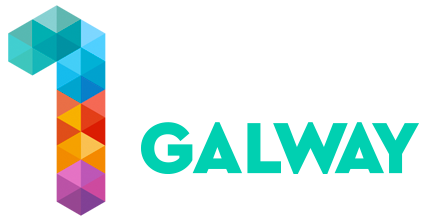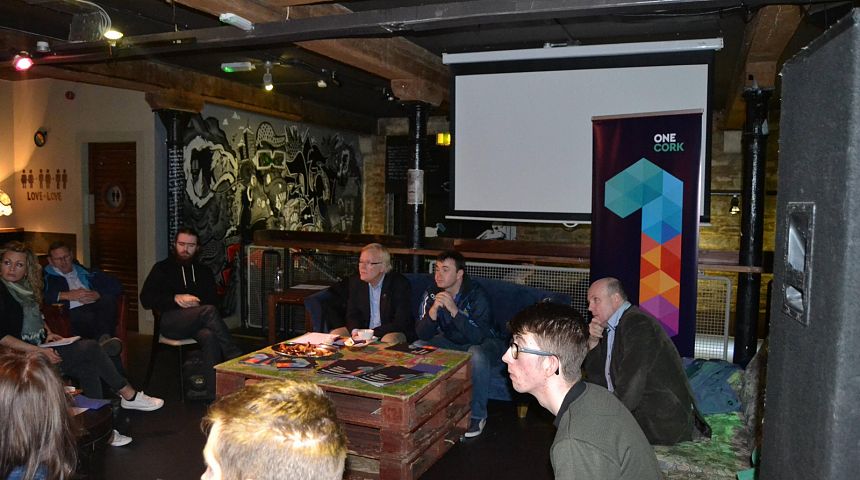Oct
State of the Nation
Location: Urban Jungle Sheare's Street Cork
Report on Meeting organised by One Cork, October 13th, 2016 The second State of the Nation Event 'Working for a Just Economy' was held on Thursday 13th October 2016 at 7pm in the Urban Jungle (Sheare's Street). Michael Taft, Research officer with Unite Union reflected on the idea and challenges of a just economy. What does it look like? How do we, as trade unionists, work toward it?
Michael began his presentation by outlining the results of a survey of the attitudes of Irish people that was carried out by Amarach Consulting last year. The results of the survey make interesting reading for trade unionists and progressives. Respondents were asked to identify the most important ingredients that the State should provide to enable a happy life . These ingredients were:
· A universal and free health service
· Worklife balance
· Freedom of choice
· Access to education
· Fiscal security
Michael went on to argue that these findings should be a source of optimism for people on the Left. They constitute goals around which a broad coalition can coalesce and advocate. However he also pointed out that there are major challenges ahead. The survey results also painted a bleak picture for the future of trade unions, who were identified by respondents as having declining power and influence. The current situation would seem to bear out this negative assessment. In Ireland today, 84% of private sector employees and 40% of public sector workers are not in a trade union.
So what should a broad coalition of the Left and progressive forces campaign for? Michael believed that there were a number of ‘common sense’ objectives, which could resonate with ordinary people. He identified 4 objectives. These were:
- Reduce the average working week to 30 hours - This achievement of this objective would provide immense opportunities for people to focus their time and energies on other life fulfilling tasks other than work. The possibilities are endless, for example they may be caring responsibilities, education goals and hobbies. Giving people these opportunities would create new opportunities for creating social capital.
- Develop the concept of a social wage - Social insurance in Ireland is low for both employers and employees. In fact the overall effective tax rate for employees is also less compared to the majority of European counterparts. On the other hand, indirect taxes such as VAT and charges are quiet high compared to other countries. Increasing social insurance contributions would provide a clear set of funding for pensions and unemployment benefits, which together constitute the 'social wage'. Advocating the concept of a social wage, would clearly make the link for workers between taxation and derived benefits.
- Make the workplace more democratic - workers want an increased say in how their workplaces are ran. Effective organizations already recognize this. It needs to be recognized in every workplace. There are numerous ways of doing this e.g. works councils ( commonly used in Germany), worker co-ops, public ownership. Transforming the workplace will also transform the service provided.
- Make the State an employer of last resort – The State should act as a public employer of all people who may be long term unemployed. People should be employed on a living wage and work on tasks that will contribute to the public wellbeing. In conjunction with undertaking these roles, participants would get training and further education. Schemes such as these would greatly contribute to social capital and the public realm. The cost of such an initiative is €250 million for one year, which is the cost of the USC reduction in the 2017 Budget.
The discussion then moved on to how can a broad alliance be built to realise these objectives. It was accepted by all of the impact of neo-liberal ideology on current ideas among workers. There was a particular focus on can this ideological discourse be challenged with students and young people. The importance of getting progressive ideas into the public discourse was also discussed. Issues such as climate change were also identified and their relationship to building an alternative agenda were also identified. The problems of political sectarianism and obsession with party political agendas were also discussed.
Overall the meeting agreed that in Cork, the seeds of a progressive alliance could be sown through the identification of a small number of feasible objectives that could grow popular support. For example, there was a discussion of the concept of mass participation (‘democratic budgeting’ and ‘popular budgeting’ ) in the preparation of Cork City Council and Cork County Council Budgets. This method of mass engagement has already been successfully tried in Brazil.
Back To Events

